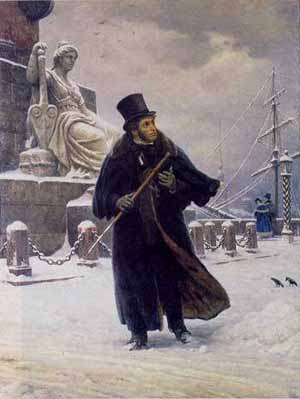03.06.2009
May 28, 2009 (the date of publication in Russian)
Alexander Sobko, Andrey Kobyakov
RUSSIA'S IMMORTAL SYMBOL
Alexander Pushkin exemplifies the complexity of Russian national identity
 On June 6, 2009, Russians celebrate the 210th anniversary of their greatest poet Alexander Pushkin, whose verses are translated into most of the languages of the Earth. Pushkin has shaped the Russian identity to the same extent as William Shakespeare determined the English culture. The immense significance of his role had been recognized by generations of statesmen of various epochs, equally in the Russian Empire and the USSR. But in this year, the Ministry of Culture did not bother to spend a ruble for the traditional celebration in the poet's family estate in Mikhailovskoye.
On June 6, 2009, Russians celebrate the 210th anniversary of their greatest poet Alexander Pushkin, whose verses are translated into most of the languages of the Earth. Pushkin has shaped the Russian identity to the same extent as William Shakespeare determined the English culture. The immense significance of his role had been recognized by generations of statesmen of various epochs, equally in the Russian Empire and the USSR. But in this year, the Ministry of Culture did not bother to spend a ruble for the traditional celebration in the poet's family estate in Mikhailovskoye.
The implications of the crisis – that resulted from ignorance of universal values – was not an obstacle for the same Ministry of Culture, headed today by a professional diplomat, to waste dozens of millions for the pompous Eurovision show in Moscow. This shameful fact was indicated in the speech of the Ambassador Mikhail Demurin at the jubilee conference in the State Pushkin Museum, organized by the newly-founded Institute of Dynamic Conservatism.
"What we witness today is a catastrophic degradation of Russia as a subject of culture. Not surprisingly, this degradation encompasses also foreign policy", Mr. Demurin said.
"In one of my lectures for the Foreign Ministry staff, focused on the Russian-European tensions around the Baltic States, I quoted Pushkin's poem "To the Slanderers of Russia" that used to be taught at the eight form of secondary school. A young diplomat was very impressed and asked me to send him the whole text by e-mail", the Ambassador said. "This example illustrates that our poor political performance is not a result of "inefficient management": it is rather a result of neglect of our historical background. During the last years, regardless for official government statements, we have been ignoring the Russian tradition. In case we lose the remains of cultural identity, we'll be culturally and politically shaped from outside".
Savva Yamschikov, chair of the Russian Restauration Association, indicated that Pushkin's family estate in Mikhailovskoye is one of the few Russian nobility estates that has not been destroyed during the last decades. He reminded about the huge part of architectural and cultural heritage that has been demolished during the last two decades, with frequent personal involvement of ex-Culture Minister Mikhail Shvydkoi. Valentin Kurbatov, a writer and critic, urged the Russian intelligentsia to seek spiritual revival in Alexander Pushkin's heritage. "The great poet is to become a symbol of national revival", he said.
Mikhail Lermontov, heir of another great Russian poet and chair of the Lermontov Heritage Association, believes that the spiritual and moral values of the nation, shaped by most outstanding poets, artists, and statesmen, can be transformed into a vital impetus of the Russian civilization's cultural search.
Philosopher Eduard Popov reminded that Alexander Pushkin dedicated eleven years of his life to state service, analyzing the development of the poet's thinking from revolutionist ideals to conservative views. Alexander Kazin, a professor from St. Petersburg, characterized Pushkin as a poet of Orthodox statehood, recognizing his crucial role in the reconstruction of the cultural nucleus of the Russian civilization. The subject of Slavophilia in Pushkin's heritage was addressed also by literature theorist Yury Loshchitz.
Sergey Pykhtin, secretary of Great Russia Party's federal board, expressed the view that in the period between 1830 and the day of his death, Alexander Pushkin was a convinced conservative, illustrating the thesis with extracts from the poet's heritage. Mr. Pykhtin reminded that in 1833, Pushkin had an opportunity of becoming the Russian Emperor Nikolay I's personal advisor, similarly to historian Nikolay Karamzin who played this role at the court of Alexander I. The politician believes that at that crucial time, the Emperor, with assistance from Pushkin and Patriarch Philaret, could introduce changes in the foundations of the Russian state that would have secured Russia from the disturbances of later centuries.
Was Alexander Pushkin a conservative? The assessment depends on the approach. Vitaly Averyanov, Director of the Institute of Dynamic Conservatism, portrayed Alexander Pushkin as an example of a Russian intellectual who has liberated himself from the typical complex of cultural inferiority of his nation, recognizing the power of his country's tradition and contributing to its plenitude. Dr. Averyanov believes that the poet's biography is very significant as a subject of study for the intelligentsia of today.
"It is very symbolical that we start the activity of our institution with a conference on Pushkin's heritage", Dr. Averyanov said. "The example of Pushkin, particularly the synthesis of national and universal aspects of his thinking and creative work, illustrates the non-linearity of the formula of dynamic conservatism".
The participants of the conference expressed different views on the timing of the decisive change in Pushkin's thinking, as well as on his relationship with the Emperor. The discussion itself illustrated the permanent process of analysis and self-analysis, essential for development of the national identity that expresses itself through the self-unfolding living tradition. In fact, Pushkin's personality reflects the specific features of the Russian culture that contains both national and universal elements. The address to Pushkin's heritage thus enables to test the correspondence of the current reality to the tradition of Russia.
Number of shows: 4461
 ENG
ENG 

 ENG
ENG 
